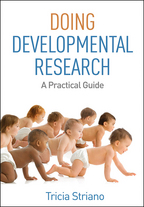Doing Developmental Research
A Practical Guide
Tricia Striano
HardcoverPaperbacke-bookprint + e-book
Hardcover
orderFebruary 18, 2016
ISBN 9781462524433
Price: $62.00 177 Pages
Size: 6⅛" x 9¼"
Paperback
orderFebruary 19, 2016
ISBN 9781462524426
Price: $41.00177 Pages
Size: 6⅛" x 9¼"
Addressing practical issues rarely covered in methods texts, this user-friendly, jargon-free book helps students and beginning researchers plan infant and child development studies and get them done. The author provides step-by-step guidance for getting involved in a developmental laboratory and crafting effective research questions and proposals. Tips on recruiting study participants cover access issues—such as how to overcome language and cultural barriers—and include helpful sample scripts. The book offers time management strategies, pointers for organizing and communicating data, and a roadmap of the journal publication process, complete with an annotated sample article. Numerous concrete examples, checklists, worksheets, and exercises are featured. Reproducible forms can be downloaded and printed in a convenient 8½“ x 11” size.
Pedagogical Features
Pedagogical Features
- Chapter subheadings written as questions to help students quickly find the answers they need.
- Key tips and checklists for managing each phase of a study.
- Exercises that build core research skills.
- Annotated sample journal article with commentary on the writing and publication process.
“A wonderful how-to guide. Unlike typical research methods texts, the book addresses the many practicalities of becoming an effective developmental researcher, including how to choose a lab, identify a worthy research question, recruit participants, write an IRB protocol, network at conferences, publish an article, and more. In a conversational style, Striano provides nuggets of wisdom, illustrative quotes, and many interesting, creative exercises that reinforce the content and provide practice with key skills. I haven't seen any other book like this. It will be a useful adjunct to standard research methods texts. In addition to covering the nuts and bolts of actually doing research, the illustrations and exercises will enrich students’ experiences and provide fodder for meaningful discussion.”
—Celia A. Brownell, PhD, Department of Psychology, University of Pittsburgh
“This unique resource provides an incredible wealth of knowledge and support. Striano draws from her extensive experience working in a variety of research settings with infants and children, and lays out all of the advice that budding developmental scientists may not even know they need. I will recommend this handbook to all of my advanced undergraduate and graduate students, as well as to early-career researchers who may be considering adding developmental research to their repertoire. Developmental science requires special skills and resources; this first-of-its-kind book lays out extremely useful tips for becoming established in this professional domain. Bravo!”
—Janet E. Frick, PhD, Department of Psychology, University of Georgia
“This is a great hands-on book that walks the reader through aspects of conducting research not covered in most methods books. I like how the chapters are organized around key questions, and the forms and scripts are terrific, particularly for students who have never been involved in a project. The exercises are thought provoking and necessary for anyone doing research with children. The tips and worksheets make this a book to be used—not just read—in parallel with traditional research methods texts. I plan to use it as a supplement for my research methods class. I also recommend this book for thesis students and for undergrads interested in going on to grad school.”
—Melissa Y. Delgado, PhD, School of Family and Consumer Sciences, Texas State University
“Research can be a daunting proposition to students—and not everyone can count on finding a true mentor. Striano provides an easy-to-read guide to help students get the most out of their research experience and cultivate the professional habits of mind they will need in any field they enter.”
—Roberta Michnick Golinkoff, PhD, School of Education and Departments of Psychology and Linguistics and Cognitive Science, University of Delaware
“Reading this manual is like shadowing a successful child development researcher as she oversees experiments in her lab. Striano provides a step-by-step guide to help students organize effective research projects. Numerous exercises and checklists will be useful for students in undergraduate research methods courses and honors seminars. An annotated journal article illustrates how to write and publish scholarly papers, and the surrounding chapter demystifies the peer review process. Practical tips about organizing a lab, developing a professional network, and establishing productive writing habits will benefit master's and doctoral students.”
—Georgene Troseth, PhD, Department of Psychology and Human Development, Vanderbilt University
Table of Contents
1. Selecting a Laboratory2. Your First Days and Weeks in the Laboratory
3. Managing Your Time
4. Developing Your Ideas and Immersing Yourself in the Culture of Research
5. Developing Your Research Question and Proposal
6. Recruitment and Access
7. Organizing and Planning Your Study
8. Strategies for Statistics
9. Writing Up Your Research
10. Selecting a Journal and Establishing Authorship
11. Communicating Your Research
Index
About the Author
